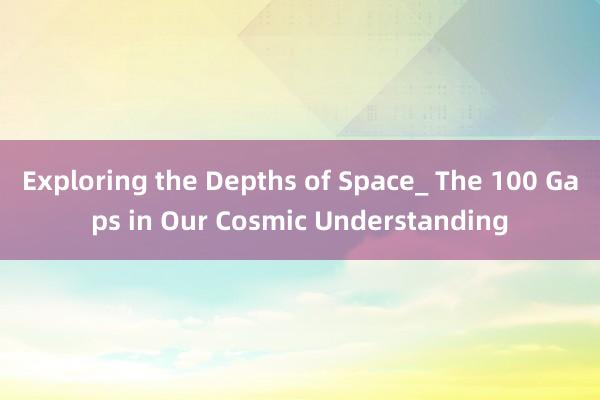Exploring the Depths of Space_ The 100 Gaps in Our Cosmic Understanding

Unveiling the Cosmic Gaps

Space, the vast expanse beyond our planet, is not only a place of wonder but also a realm filled with scientific mysteries. Despite the incredible progress made in astronomy, space exploration, and technology, there are still hundreds of gaps in our knowledge. These gaps—referred to as the "100 gaps"—are the unknowns that scientists are actively seeking to fill. Some of these gaps are rooted in fundamental questions about the universe, while others arise from recent discoveries that continue to challenge existing theories.
1. The Origin of the Universe
The most profound question in cosmology revolves around the origin of the universe itself. The Big Bang theory is the dominant model, but the exact conditions leading to this event remain a mystery. What triggered the Big Bang? Was there a cause, or did it arise spontaneously from a quantum fluctuation? And, more importantly, what existed before the Big Bang, if anything? This question is still a subject of intense research and debate.
2. Dark Matter and Dark Energy
Despite making up about 95% of the universe’s mass-energy content, dark matter and dark energy remain among the greatest unsolved mysteries in space science. Dark matter is hypothesized to account for the gravitational effects observed in galaxies, but its composition is unknown. Similarly, dark energy, a mysterious force that accelerates the expansion of the universe, remains one of the most puzzling concepts in physics. The discovery of what dark matter and dark energy actually are could completely transform our understanding of the cosmos.
3. The Formation of Galaxies
Galaxies, the building blocks of the universe, form the structure of the cosmos. However, scientists are still unclear about how galaxies form and evolve. What triggers the birth of a galaxy? How do supermassive black holes at their centers influence their growth and behavior? While we have a basic understanding of galaxy formation, the precise mechanisms at play are still a topic of ongoing study.
4. The Nature of Black Holes
Black holes, regions of space where gravity is so intense that not even light can escape, have fascinated scientists for decades. While we understand the basic physics of black holes—thanks to Einstein’s general theory of relativity—there are still many unknowns. For instance, what happens at the singularity, the point of infinite density at the center of a black hole? Is there a way to directly observe or measure the properties of a black hole’s interior?
5. The Fate of the Universe
What will become of the universe in the far future? Will it continue expanding forever, slowly cooling as stars burn out, or will it collapse back in on itself in a “Big Crunch”? These are questions that cosmologists have been grappling with for years, but the answers remain elusive. The ultimate fate of the universe is a topic that encompasses both theoretical physics and observations of distant galaxies, making it one of the most intriguing areas of research.
6. The Search for Extraterrestrial Life
Perhaps one of the most exciting and widely discussed gaps in space research is the search for extraterrestrial life. The discovery of even simple microbial life on another planet or moon would have profound implications for our understanding of life in the universe. The question is whether life is common in the universe or a rare occurrence. The search for signs of life on Mars, Europa, and beyond is ongoing, but as of now,chich69 we have yet to find definitive proof of extraterrestrial life.
7. The Mysteries of Exoplanets
Exoplanets, go88 tài xỉu or planets that orbit stars outside our solar system, phim rule 34 have been discovered in abundance. Yet, many questions about these distant worlds remain unanswered. What makes a planet habitable? Are there other Earth-like planets out there? What conditions would be necessary for life to thrive elsewhere? The study of exoplanets is a rapidly evolving field, but there is still much to learn about these fascinating distant worlds.
8. The True Nature of Time
Time is a fundamental concept in our understanding of the universe, but its true nature is still a subject of debate. Is time an illusion, as some theorists suggest, or is it an intrinsic part of the fabric of the universe? The theories of relativity have revolutionized our understanding of time, but there is still much we don’t understand about its relationship with space and gravity.
9. The Holographic Principle
The holographic principle is a theory that suggests that the entire universe can be described as a two-dimensional information structure "painted" on the cosmological horizon. While this may sound like science fiction, some researchers believe it could offer answers to unresolved questions in quantum mechanics and gravity. If proven true, the holographic principle could fundamentally change our understanding of reality.
10. Quantum Gravity
One of the greatest unsolved problems in physics is the unification of quantum mechanics and general relativity, two fundamental theories that govern the microscopic and macroscopic realms, respectively. The search for a theory of quantum gravity—one that can describe gravity at the quantum scale—is one of the key challenges in modern theoretical physics. What is the nature of space-time at the smallest scales? How can gravity be explained in quantum terms?
11. The Multiverse Hypothesis
Is our universe the only one? The multiverse hypothesis suggests that our universe is just one of many, perhaps infinite, parallel universes that exist. These universes could have different physical laws, dimensions, and histories. While the multiverse idea is fascinating, it remains highly speculative, and scientists have yet to find concrete evidence for its existence.
đăng ký đăng nhập slot go8812. Cosmic Inflation
The theory of cosmic inflation proposes that the universe underwent an exponential expansion in the first fraction of a second after the Big Bang. This theory explains many of the observed features of the universe, such as its uniformity. However, the exact mechanics of inflation, as well as its implications for the broader structure of the cosmos, are still unclear.
13. The Role of Supernovae in Element Formation
Supernovae are explosive events that mark the death of massive stars. These cosmic explosions are thought to be responsible for the creation of many of the elements that make up the universe. However, the precise role of supernovae in element formation, especially in the early universe, is still an open question. How do these explosions create the building blocks of life?
14. The Mystery of Cosmic Rays
Cosmic rays are high-energy particles that originate outside our solar system, but their exact source remains a mystery. Are they the result of supernovae, black holes, or some other phenomena? Understanding the origin and composition of cosmic rays could provide valuable insights into the most energetic processes in the universe.
15. The Search for a Unified Theory
A key goal in physics is to develop a unified theory that explains all fundamental forces in the universe, including gravity, electromagnetism, and the strong and weak nuclear forces. While the Standard Model of particle physics has been highly successful, it doesn’t account for gravity. The search for a unified theory—sometimes referred to as the Theory of Everything—is one of the ultimate pursuits in scientific research.
Delving Deeper into the Cosmic Unknowns
While the gaps in our understanding of space are numerous, some are more immediate and practical than others. The mysteries that scientists are working to unravel could one day lead to breakthroughs that redefine humanity’s place in the universe and open up new possibilities for exploration and discovery. Let’s continue our journey through the remaining gaps in our cosmic knowledge.
16. The Fate of Black Hole Information
One of the most perplexing questions in theoretical physics involves the so-called “information paradox.” According to quantum mechanics, information about a physical system should never be lost. However, when something crosses the event horizon of a black hole, it seems that information is destroyed, violating this fundamental principle. How do we resolve this paradox? What happens to the information swallowed by black holes?
17. The Composition of the Early Universe
While the Big Bang theory provides a framework for understanding the universe’s origin, the exact conditions during the first few moments of the universe’s existence are still unclear. What was the composition of matter and energy in the very early universe? How did the first particles and atoms form?
18. The Role of Magnetism in Galaxy Formation
Magnetism is a fundamental force that plays a crucial role in many cosmic phenomena, including the formation and evolution of galaxies. However, scientists are still uncertain about the exact role that magnetic fields play in these processes. How do they affect the behavior of gas and dust in galaxies? And how do they influence star formation?
19. The Existence of Cosmic Voids
Cosmic voids are vast regions of space that are largely empty, devoid of galaxies and other structures. These voids, which make up a significant portion of the universe, challenge our understanding of cosmic structure and formation. What causes these voids, and what role do they play in the evolution of the universe?
20. The Mystery of the Kuiper Belt
Beyond the orbit of Neptune lies the Kuiper Belt, a region filled with icy bodies and dwarf planets, including Pluto. While we have some understanding of the Kuiper Belt, there is still much to learn. How did it form? What are the true characteristics of the objects within it? The study of this distant region will likely reveal important clues about the early solar system and the processes that shaped our corner of the cosmos.
Conclusion: The Endless Pursuit of Knowledge
The 100 gaps in space exploration are just the beginning. Every discovery leads to new questions, and every unanswered question opens the door to new research. Whether we are contemplating the origin of the universe, the nature of dark matter, or the possibility of life beyond Earth, the mysteries of space remind us of how much we still have to learn. As technology advances and our understanding deepens, the quest to fill these gaps will continue, bringing humanity closer to unlocking the secrets of the cosmos.
With each new discovery and theory, the universe becomes a little more understandable, yet infinitely more mysterious. The journey is just beginning, and the 100 gaps in our knowledge will undoubtedly fuel the curiosity and ambition of generations to come. The future of space exploration promises to be one of wonder, challenge, and, perhaps, profound revelation.






